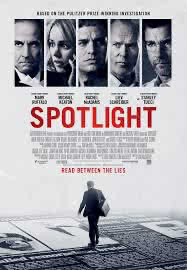Spotlight

Tom McCarthy’s Spotlight deserves each and every award and glowing review. A constellation of riveting acting performances coalesce to shine necessary attention on the epidemic of clergy members’ abuse of young boys and the gruesome cover-up methods that became a horrific routine. The film industry’s top critics and award judges have ensured that Spotlight receive the attention and praise it deserves for its chilling delineation of the investigation launched by the committed reporters of the Boston Globe’s Spotlight team. These masterful journalists dared to challenge the status quo which long assumed a cooperative agreement between church, state and the press, even if it came at the expense of children’s safety and wellbeing.
From a psychological perspective, one of the many dimensions this film gets right is its portrayal of the trajectory of sexual abuse victims, the cycle of sexual abuse, and the distorted rationalizations playing out behind closed doors. Recovery is a long and fraught road, and the array of victims interviewed by the Spotlight investigative reporting team comprise a realistic picture of the lasting legacy of sexual abuse. Some of the victims interviewed are functioning reasonably well in their adult lives and have built marriages and families. Nevertheless, when interviewed, it is obvious that the wounds still feel raw and the pain has endured. Other victims seem emotionally frozen in time, paralyzed by the traumatic abuse inflicted by the very figureheads their were told to trust and revere.
In one of the most memorable and disturbing scenes of the film, investigative reporter Sacha Pfeiffer (Rachel McAdams) knocks on the door of the retired Father Ronald H. Paquin and asks if he ever sexually molested young boys. Sacha looks surprised, even confused, by Father Paquin’s mild manner and even more shocked when he blurts out his matter-of-fact response. Yes, he admits that he did abuse the boys, and that he was abused himself. He continues: “I fooled around, but I never raped anyone and I never felt gratified.” Paquin’s meek presentation and the ease with which his rationalizations flow toward Ms. Pfeiffer hint at a hidden but thriving pathology of the cycle of sexual abuse: it is quite common that abusers have been abused themselves. Often, the abuse takes the shape of a slow progression. It may begin as a seductive friendship so well described by a victim advocate in the film who explains: “When a priest pays attention to you, you feel special. How do you say no to God?” Abusers try to make their victims feel special — and chosen — and they use rationalization methods in concert with Father Paquin’s remarks. They might tell a victim that most grown-ups don’t understand the special bond that’s developing. Whether the predator is a priest or a teacher or a babysitter or a relative, the methods used to rationalize the abuse only compound the trauma experienced by victims.
This important film may be painful for victims to absorb. Survivors should view with caution and do so in the presence of a supportive figure. Several clients who know someone close to them who is a survivor of abuse find Spotlight to be both enlightening and informative.
